Brian Williams to the rescue!
How Bison Dele became a Bulls bench star and found peace along the way
On April 1, 1997, with the Bulls playing Boston at the United Center and just 10 games to go in the season, one of the most consequential members of our 5th championship team was merely a fan in the stands. The man who would deliver major performances in two of our four clinching games wasn’t even a Bull.
As Brian Williams took in the win and hung out at the UC with Billy Corgan, the pressure on him was ironically off. You would think signing with the 63-9 defending champs, a team that was suddenly in desperate need of frontcourt help, would be a stress inducer.
Williams wanted to win a championship — not just win it, but contribute. He had pressure in that sense. But right at that moment, watching his soon-to-be teammates, I imagine he felt pretty good. He had refused to re-sign with the Clippers, held out the whole season, turned down multiple million-dollar offers and landed for pennies on the best team in American sports.
And he’d done it without giving up his lifestyle, which included skydiving, cycling cross country, running with the bulls in Spain and getting his pilot’s license.
“Yeah, I’m a free spirit,” Williams said after signing for about $27,000 for the rest of the season. “But that in no way makes me eccentric beyond the capabilities of team chemistry.”
In six championship seasons, 31 players were on a postseason roster. Only one played more playoff games than regular season games: Brian Williams.
Two seasons after his time on the Bulls, Williams changed his name to Bison Dele. Less than three years after that, he was dead in a manner that felt morbidly fitting: lost at sea, presumed murdered by his own brother, after prematurely leaving his million-dollar NBA career. The mystery of Bison Dele, his life and his death, is an important story.
But let it not overshadow another story: Bison Dele was a helluva ballplayer.
And his contributions were essential for championship #5.
A patient free agent
The ‘96 Bulls went 72-10.
For a while, the ‘97 Bulls looked just as good.
The team started 12-0 and 17-1, and even when they fell behind the 72-10 pace they were still eons beyond the rest of the league. Michael Jordan was at an MVP level again, and Scottie Pippen joined him in playing all 82 games, something he had not done since 1992.
The chips in the armor, when they came, were in the frontcourt. Just after Thanksgiving, Luc Longley separated his left shoulder while body surfing and was out until the middle of January. One game after Longley returned, Dennis Rodman was suspended for 11 games for kicking a cameraman1.
Kukoc started in Rodman’s place, but at the end of February the reigning Sixth Man of the Year injured his right foot and was out until March 27. By then, Rodman had been out two days with a sprained ligament in his left knee. He planned to be ready for the playoffs. Bill Wennington was not as lucky: in the midst of a terrific season, especially filling in for the surf-injured Longley, the sharp-shooting Wennington ruptured a tendon in his left foot against the Nets on March 29. He hoped to be back by the second round.
Looking at the rest of the roster, Jason Caffey had missed time and Dickey Simpkins was still developing into a steady player. In the win over Boston on April 1, Robert Parish took Wennington’s spot as the #2 center, contributing a solid 12 minutes. But Parish was 43 and in his final season. He wasn’t going to deliver huge playoff minutes against Patrick Ewing, Alonzo Mourning or Dikembe Mutombo.
The long-term answer was in the stands. Dele, who had been working out with the team for a few days, was in the midst of a season-long odyssey. That was not new for him. The 10th pick in 1991 out of the University of Arizona, Dele played two years with the Magic and then went to Denver, where he became the #1 big man off the bench for the ‘94 Nuggets. When the Nuggets knocked off the #1 seed Sonics in Game 5 to complete a miraculous 2-0 first-round comeback, Dele had a monster game, with 17 points and a game-high 19 rebounds, four more than teammate Mutombo.
The Nuggets traded him to the Clippers after 1995, where he became a strong starter on a bad team. Instead of opting into his $2.5 million option for 1997, up from $2.2 million, Dele opted out and became an unrestricted free agent in the madcap 1996 offseason. This was the summer that Shaq, Mourning and Juwan Howard all scored $100 million deals, while MJ returned to the Bulls for his record-setting one-year deal of $30 million.2
For Dele and the Clippers, the summer dragged on. The team thought they would re-sign him but recognized that his unique personality might curtail that process.3 By the time camp started, Dele had declined a $35 million offer from the SuperSonics and was fending off overtures from the Heat.
“We have inquired about him,” Heat coach and GM Pat Riley said. “Everybody knows he has the athletic ability. … Maybe (he’s unsigned because of) the market or it could be what they’re asking. He’s a talented player, but we’re limited as to what we can do because of the cap.”
Dele had no interest in returning to the Clippers. I think the best explanation is that playing there did not satisfy his soul. This was the same franchise that had suspended Ron Harper a few years earlier for likening his time there as a jail stint. So he waited. And in December, he fired his agent and hired a new agent: Dwight Manley, best known for representing another curious big man: Dennis Rodman.
“We’re just exploring all options,” Manley said. “The Clippers have been really cool. They’ve been very accommodating. At this time, Brian is open to anything.”
Running with Da Bulls
It’s not that Bison Dele wasn’t accustomed to the spotlight. He grew up in a showbiz family — his father Eugene was a singer in The Platters.4
But the 90s Bulls were a different kind of spotlight. If Dele had any question of just how different life would be, that question was answered the day he attended the Bulls-Celtics game in Chicago. The Bulls won their 63rd game and played in front of a sellout crowd of over 23,000 fans, their umpteenth consecutive sellout since their sellout streak began Nov. 20, 1987.
I’m not sure if Dele ever saw a sellout crowd with the Clippers at the Los Angeles Memorial Sports Arena — unless he was in the house while unsigned in November 1996, when the Bulls came to play the Clippers and a Memorial Sports Arena-record 16,144 fans showed up.
“In L.A., we have scalpers, but they’re trying to sell tickets given to them because they don’t want to go,” Dele said.
The crazy vibes kept going. After the Celtics game, Dele attended the movie premiere5 of Rodman’s starring role in “Double Team” with Jean-Claude Van Damme. Dele signed with the Bulls the next day, April 2, prorating the league minimum of $247,500.
“I was offered $1 million to play for Utah,” he said during the playoffs when asked if he thought Jordan should have won MVP instead of Karl Malone. “I came here for $30,000. So that tells you who I wanted to play with and who I think is the MVP.”
Jordan reciprocated the goodwill.
“I want to see how well (Rodman and Williams) play together, and what kind of harmony they have as a team,” Jordan said. “With their capabilities, it could be a great matchup for us in the playoffs – with Brian at center and Dennis at (power forward). … That would be a very interesting tandem.”
The Bulls continued their larger-than-life lifestyle on April 3, visiting the White House and President Clinton while in town to play the Bullets. Dele wasn’t there — I assume the arrangements were made in advance — but that was fine. His workload was heavy. While he kidded about being able to learn the triangle easier than getting his pilot’s license (“If learning the Bulls’ offense is half as hard as doing that, I think I’ll be alright.”), the reality was different: he hadn’t played all year, and now was going to learn the triangle on the fly while getting into game shape for the league’s best team.
“I’m pretty sure Phil can simplify (the offense) a little bit so that he can fit in,” Jordan said. “Everybody is going to do everything they can to help him along. But we know this system is something you learn over a period of time. We can’t force-feed or give him too much information. Whenever the time comes, we’ll have to work him in slowly to where he feels comfortable and is productive on the court.”
The Bulls didn’t even get home from D.C. before Phil Jackson and Jerry Krause had to shelve their plan to slow-roll Dele, as Kukoc suffered another injury and was back on the injured list. Dele made his debut the next day in an 84-71 win over Cleveland. Phil called his number in the 2nd quarter and he responded with six points on 2-2 shooting in eight minutes of play.
“I just wanted Brian to get a feel for the game,” Jackson said. “He actually did some good things after limited scrimmage time and court time. For a foundling in our offense, he stumbled around into some pretty good things.”
Any notion of easing into things ended in his second game: 20 minutes, first big man off the bench, 10 points on 4-9 shooting, four rebounds. He was less than a week into his time with the Bulls; even new Bulls with a full training camp were known for still getting acclimated to the triangle through the All-Star break.
“The most difficult part is keying off certain players to know what move to make,” Dele said. “Everyone knows if you think in this game, you’re going to be a second or two too late. You have to be instinctive. I’m still thinking.”
Still, it was clear just as a fan that Dele brought something we never fully had in the dynasty: a fast, agile, young post-scorer who could create under the basket. He brought points in bursts. It was fun to think of him and Rodman out together, but I think the more important tandem was with Longley. They could play together, with Dele at the 4, but their impact was also what they collectively brought to the position. Luc was bigger and could bang defensively more easily. Dele was swift and versatile and could put a defense on its heels, literally and figuratively.
“I’m very flexible,” Dele said in the playoffs. “I can run up and down the court or I can pound with you for 48 minutes.”
After just five games with the Bulls, the Tribune called him “a lock” for the playoff roster.
“It’s better to beat your own drum.”
Jud Buechler was the first Bull to get a look at this strange, new teammate.
In Buechler’s junior year at Arizona, Maryland center Brian Williams arrived as a transfer. Per the transfer rules, he sat out the ‘88-’89 season and then played alongside Buechler in the ‘89-’90 season.
The future Bison Dele stood out immediately.
“I tell people all the time that he just did things that weren’t normal things,” Buechler told K.C. Johnson6 during the Finals. “In college, most of us just hung out, went to frat parties, went to the local tavern. Brian was always kind of hanging out with a different crowd. He was off wine tasting, horseback riding, parachuting, doing great things like that. He was definitely different from the rest of us.”
“What’s wrong with that?” Dele said in response. “You’re trying to differentiate between a typical basketball player and a non-typical basketball player. … Whether I’m a basketball player or an astronaut, whether I choose to go to a wine tasting or a toga party, it’s my choice. It’s what floats your boat.”
Dele’s unusual personality included his share of serious challenges. In 1992, he was diagnosed with clinical depression after trying to commit suicide on sleeping pills. He suffered blackouts, most frighteningly in a swimming pool and another time while driving to Magic practice, crashing his car in the process.
“The pills weren’t strong enough (to die from), but I was pretty drugged up for the next day or so,” he told the Orlando Sentinel at the time. “I think I need to get everything into the open to get well. The intent was to go to … the edge and turn around and come back. I think that I have made that turn. I think (suicide) is behind me now.”
Dele seemed like a man in search of human connection. In that respect, the Bulls were perfect. Dele came to revere Phil Jackson, and the team had two other Arizona Wildcats: Buechler was Dele’s senior, while Steve Kerr was Buechler’s. All three played for Lute Olson, with Kerr and Buechler teammates on the ‘88 Final Four team. Two days before Dele became a Bull, Olson’s Wildcats won their first national championship, even upsetting the top-seeded Tar Heels en route to the title game.
On April 14, Jordan had a triple-double in a win over the Raptors.
“I could have gotten it a lot easier if those Arizona guys would have made some baskets,” Jordan joked after.
I think that was the type of camaraderie that Dele loved. Perhaps knowing that the Bulls couldn’t bring him back for 1998 gave him the freedom to be himself, even as the new guy. Perhaps. I tend to think Dele would have been himself no matter what. As he told K.C. Johnson:
“It’s better to beat your own drum than to dance to the rhythm that someone else is pounding for you.”
Forever a champion
In the second round of the playoffs, the questions filled my mind: when will this big man thing be settled?
Longley was steady and consistent, but Wennington never returned and missed the entire postseason. Rodman was having his wildest playoffs ever, not in a good way. During the East playoffs, Rodman drew technical fouls in 13 straight games, with three ejections7. Phil had left Jason Caffey off the playoff roster in 1996, but now in 1997 he was starting: two games to open the first-round Bullets series and then the final three games of the Hawks series.
Caffey played well. So did Bison Dele.
After logging just 22 minutes total against the Bullets, Dele’s impact started to take shape against Atlanta. In Game 3, with the series tied, Caffey went for 10 and 11 while Dele and Kukoc closed out the game with 10 points apiece in the 4th quarter. In the clinching Game 5, Dele had 12 and 10 rebounds.
By the Eastern Conference Finals the honeymoon was over. Dele was now a key part of the attack and was expected to deliver. He didn’t, shooting 1-10 over the first two games.
“We’re breaking people into a system that Scottie and I have been playing eight or 10 years, ever since we’ve been here,” Jordan said about the team’s struggles, even in two wins. “The rhythm is not there. A couple of times Brian Williams forgot some of the plays. And Dennis is getting himself back. And Toni certainly has not been able to find his consistent rhythm.”
The rhythm returned. Dele went 3-4 in Game 3, 3-4 in Game 4 and 4-7 for 10 points in the clinching Game 5. What was fascinating about watching this all play out at the time was that everyone knew the team could not afford Williams in 1998. He was crushing it on a championship team and was going to score a huge deal. That heightened each moment.
“I could be designated a player-coach,” Dele joked about how the team could afford him. “They’d pay me minimum for playing and $10 million for coaching.”
After finishing fourth in minutes off the bench against both Washington and Atlanta, Dele was the first man off the bench against Miami, fifth overall, averaging more minutes than Longley. Rodman was back in the starting lineup. The big man rotation was locking in. Dele spent the first round battling Chris Webber and Juwan Howard, the second against Mutombo, the third against Alonzo Mourning and would draw the MVP Malone throughout the championship series.
His goal for the season “wouldn’t be something where I sat at the end of the bench and collected a ring because of what someone else did,” he said during the Finals. “I’d like to think I’m a vital part of this stretch run.”
After going scoreless in Game 1 and 2-5 in Game 2, both Bulls wins, Dele scored 16 and then 10 points in Games 3 and 4. That gave him five playoff games in double figures, the most of any Bulls big man off the bench in the dynasty years, not just for a season but for all seasons combined8. Though the Bulls lost both games, Dele was becoming the force that Jerry Krause hoped for back in April. He played 23 minutes in the Flu Game, and was a bench star again in Game 6.
In his final game as a Bull, with the team down 70-64 heading into the 4th quarter, Dele was part of Phil Jackson’s 1992-esque bench comeback crew, starting the final 12 minutes of the season alongside Pippen (the only starter), Kukoc and his two Arizona buddies Buechler and Kerr.
Dele defended the Mailman and ran the triangle like a Tex Winter disciple. After three Stockton free throws put the Jazz up nine, Pippen hit a pair, and Dele kicked a pass over to Kerr for a jumper. On the other end, he rebounded a missed Jazz shot and swung an outlet to Pippen, who soared upcourt and nailed a pull-up three. Jazz 73, Bulls 71. Dele’s athleticism was a major asset against Utah’s vaunted pick-and-roll, and he could defend Malone up at the elbow or on the block.
The Jazz had a rough possession out of a timeout, missing two shots. The ball was up for grabs. Dele grabbed it. Tugged it. Secured it from the scrum. The United Center fans got loud. He kicked to Kukoc and ran to fill the lane. The team ran the offense through Dele but didn’t score. Utah missed on their end and the Bulls went back into their offense, the agile Dele screening for Kukoc in the corner. Toni dribbled to his left toward the top of the key and darted a pass to Buechler, who swung the ball to Kerr in the other corner, freed up by Pippen’s down screen. Kerr nailed the triple and the Bulls had their first lead since the first quarter.
Jordan entered for Buechler, and about 90 seconds later, the game tied at 76, Rodman entered for Dele. The free spirit had helped the Bulls get into striking distance of ring #5, and when his fellow Arizona Wildcat Steve Kerr hit the shot that would make Kerr famous, Bison Dele threw his arms in the air and rushed to greet Kerr at the subsequent timeout.
On the final play of the season, Pippen saw the inbound pass going crosscourt and dove to steal the ball, batting it to Kukoc. With the clock descending toward zero and Kukoc scooping the ball up to drive to a wide-open basket for a season-sealing dunk, Kerr threw his arms up at midcourt and ran toward the bench in celebration, spinning around Dele and leaping into his arms as Kukoc’s dunk rammed through. Dele held Kerr with his right arm and threw his left into the air in celebration. The Bulls rushed the court. Kukoc and Rodman embraced. Jordan and Pippen embraced. The clock operator wiped out the remaining six-tenths of a second.
The Bulls were champions once more.
Bison Dele was a champion at last.
“This means the world to me,” he said three days later to the Bulls fans filling Grant Park. He placed his hand on his heart. “I can’t thank you all enough for embracing me. The coaches, the players, the whole organization: thank you, from the bottom of my heart.”
Bison Dele completes his journey
In an offseason full of questions and drama, there were no questions about Dele. The Bulls could only afford to pay him $290,000. In August, he got his deal: $45 million over seven years with the Pistons. He played two seasons there, changing his name before what would be his final season in the NBA.
And in the final game of his career, he put up a mini masterpiece: 8-10 from the floor for 17 points and seven rebounds in a Pistons playoff loss. A little over three months later, Dele, in Beirut, informed the Pistons that he was retiring, leaving behind the remaining $36.4 million of his contract. He didn’t think he had basketball in his heart.
“He’s going through an epiphanal moment in his life,” Manley said. Dele had played with Kerr in Orlando in 1993, his second season, and in his final season, he played with Buechler in Detroit. Buechler held out hope that Dele would change his plans, but at the end of October, Dele officially filed his retirement papers.
“I was hoping it was one of those deals where he didn’t want to go through two-a-days, or where he just wanted to miss training camp,” Buechler said about his three-time teammate.
Out in Los Angeles, new Lakers head coach Phil Jackson talked about trying to lure Dele out of retirement. It was not to be. Dele never played again, and his story of course became what it did, with his disappearance at sea in the summer of 2002, his presumed death and the news that it was likely his own brother who had killed him. Steve Kerr was among those who reached out to Dele’s mother to offer condolences.
“If it wasn’t for him, we might not have won that world championship,” Krause said in September 2002, after Dele was declared missing. “He was like a big, old kid, but he also was extremely intellectual.”
“He feels things deeply,” Manley said. “He’s very loving and very generous and not violent. I’m devastated.”
An English professor once told me that a story’s end defines its middle. Bison Dele’s end casts a shadow over his entire life, making everything all the more tragic and ephemeral. But when I think of Bison Dele, the man we knew as the bubbly #18 Brian Williams, I think of him out there with his Arizona brothers, helping the Bulls win a title while the game’s biggest star watched from the bench. I think about him holding Steve Kerr on the court in the final moments of Game 6. I think of him beaming into the crowd at Grant Park, placing his hands on his lips and blowing a kiss to every Bulls fan alive.
His NBA payday was ahead of him, but his actual payday was this. Right then, right there. That championship at the United Center. That celebration at Grant Park. That was what he’d waited for.
The beauty was that he knew it.
-
-
-
Thanks for reading, and I hope everyone had a great summer. I just hit 1,000 subscribers — thank you to everyone who has signed up! Please keep sharing with your Bulls fan friends. I appreciate it! More to come…
Jack
This was Rodman's 10th career suspension, all since November 1992. The first seven suspensions were a game apiece, all with Detroit and San Antonio. This was his third suspension in a season and a half with the Bulls: six games for headbutting a referee, two games earlier this season for yelling at officials, and then 11 games for this. At the time, it was the second longest suspension in NBA history, trailing only the 26 games Kermit Washington got for punching Rudy Tomjanovic. Rodman's headbutting suspension was fifth all-time, making him the only player with two of the top five.
That was the first free agent bonanza summer: Shaq jumped from Orlando to the Lakers for $120 million; Juwan Howard tried to leave the Bullets for the Heat for $100.8 million, a deal the NBA rejected, and he went back to the Bullets $105 million; the Heat then re-signed Alonzo Mourning for $105 million; and the Knicks tried to steal MJ away from the Bulls. When they couldn’t, they signed Detroit’s Allan Houston for $56 million and traded for Charlotte’s Larry Johnson. Gary Payton re-signed with Seattle for $85 million, Mutombo left Denver for Atlanta for $50 million, and Reggie Miller, John Stockton and Steve Smith all signed big deals to return to their teams.
Dele died after going missing, but his life was spent traveling and searching and confounding people. He transferred from Maryland to Arizona, played on five NBA teams in his eight seasons and retired young. When he was a holdout from the Clippers during training camp in October of 1996, the L.A. Times ran a frighteningly portentous headline: “A Clipper’s Missing, but Who’s Counting?” The first paragraph described Williams thusly: “(his) whereabouts and intentions remain unknown.”
Everything around Bison Dele’s life and story seemed draped in mystery, even the elements that seemed like common knowledge, starting with this one: “Brian Williams’s father was in The Platters.” That is true. But sometimes the story was that Williams’s father was Tony Williams, and other times it was Eugene “Gene” Williams. Dele himself talked about The Platters and his father but never, as far as I found, clarified. The confusion is this: singer Tony Williams was the lead singer of the vocal group The Platters, founded in 1952 and best known for songs “The Great Pretender,” “Only You (And You Alone)” and “Smoke Gets In Your Eyes.” The group performed through the 1960s and disbanded. In 1970, Platters manager and song writer Buck Ram rebooted the group from scratch, holding auditions to build a new lineup whose act would center around the classic Platters songs. In that new group was vocalist Gene Williams, Bison Dele’s father. The young Brian Williams was one when his father joined the new Platters, so he indeed did grow up in a showbiz household, but with Gene Williams of the new Platters, not Tony Williams of the original.
Held at the nightclub Drink, at 541 W. Fulton.
Rodman in the 1997 playoffs: 19 games, 18 technical fouls, 74 fouls, three ejections. Fortunately in the Finals, he only drew two technicals and was not ejected.
Of all Bulls centers during the six title seasons, Luc and Cartwright had the most playoff games in double figures, Luc with 19 in 55 games, Bill with 14 in 58. Bison Dele’s five was the next most, despite only playing 19 total playoff games. Scott Williams — another forward/center like Dele — had four in 53 games, Will Perdue had two in 48, F/C Stacey King had two in 44. No other Bulls center, or backup power forward, scored in double figures in the playoffs.

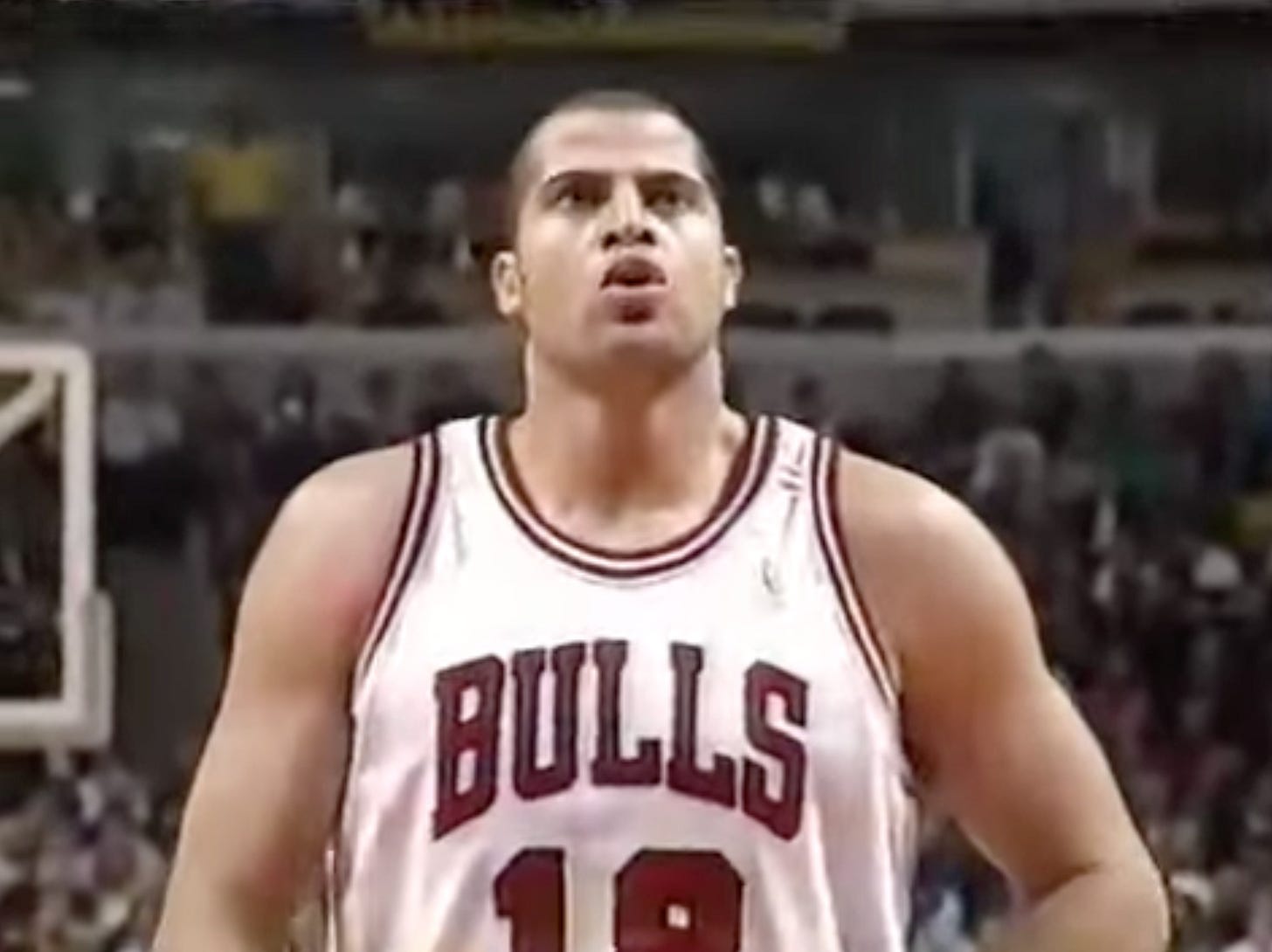
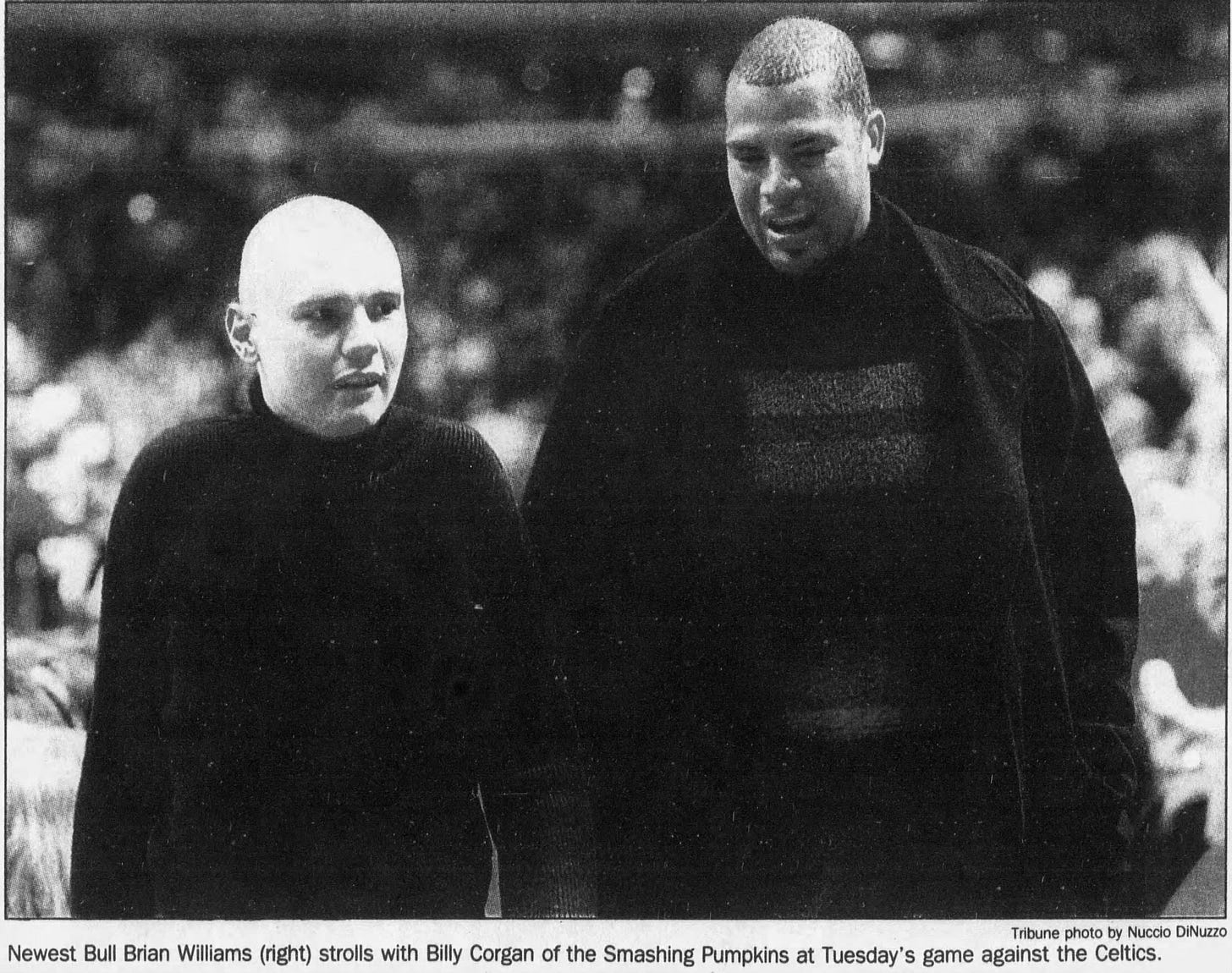
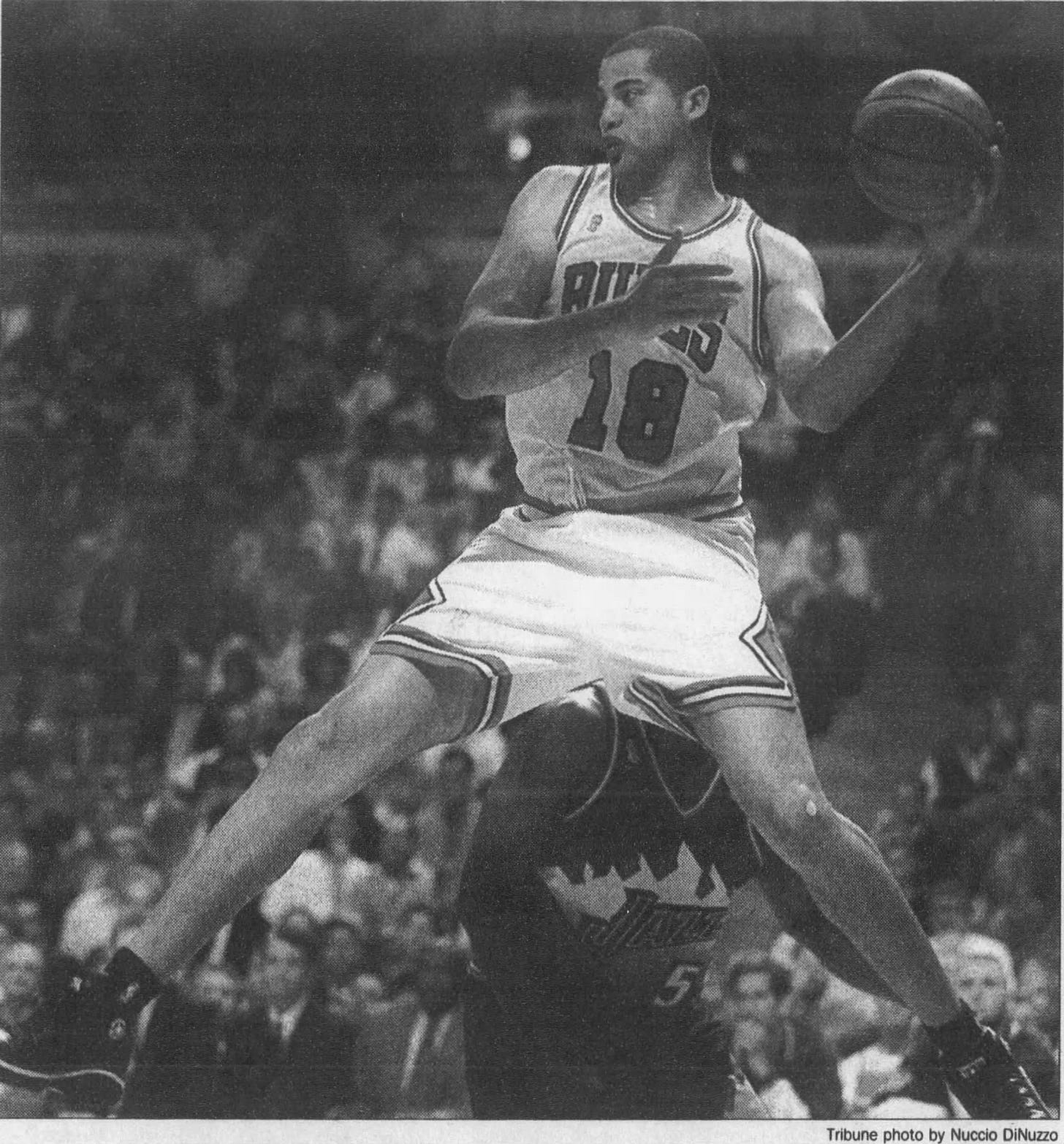
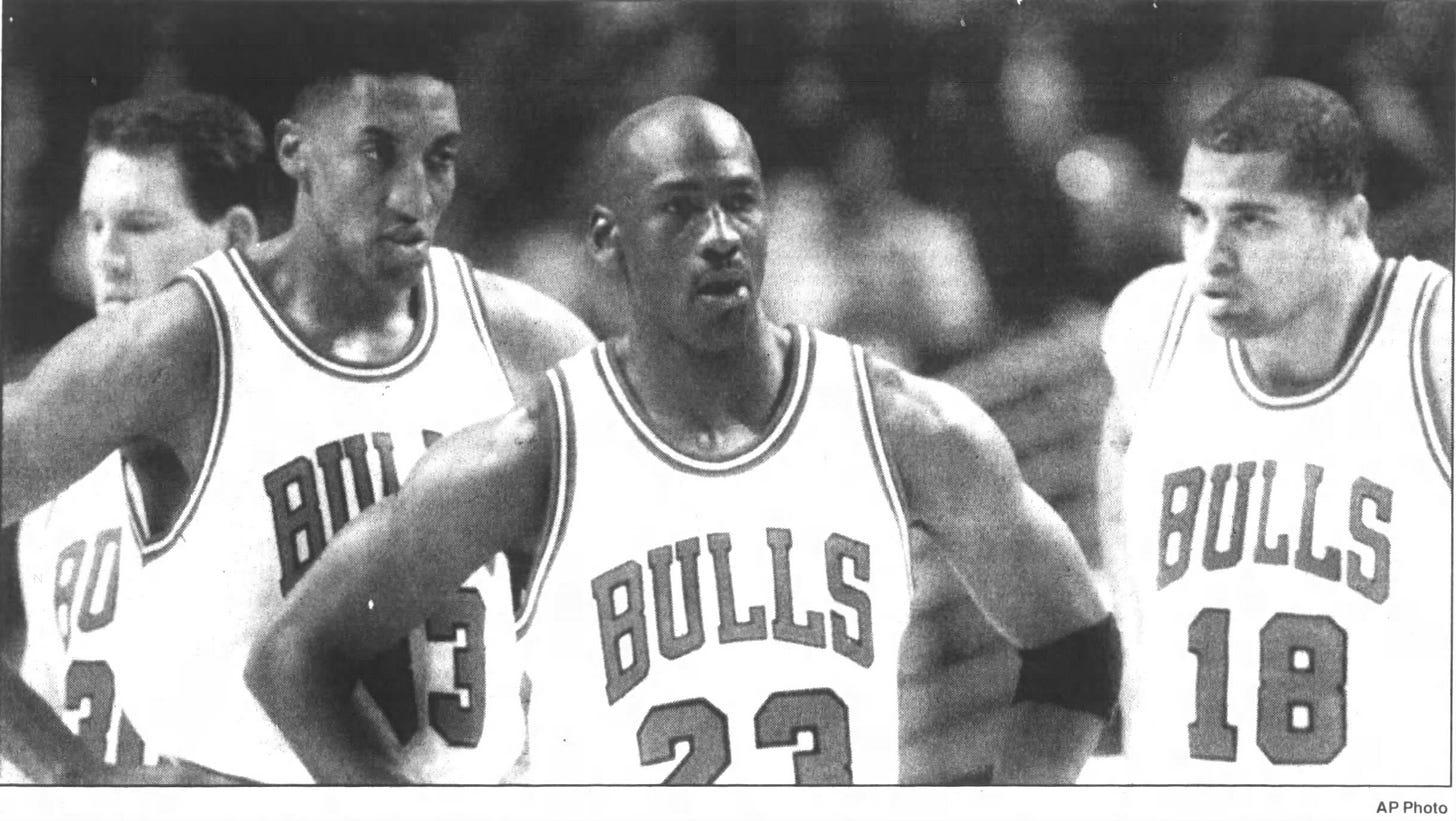
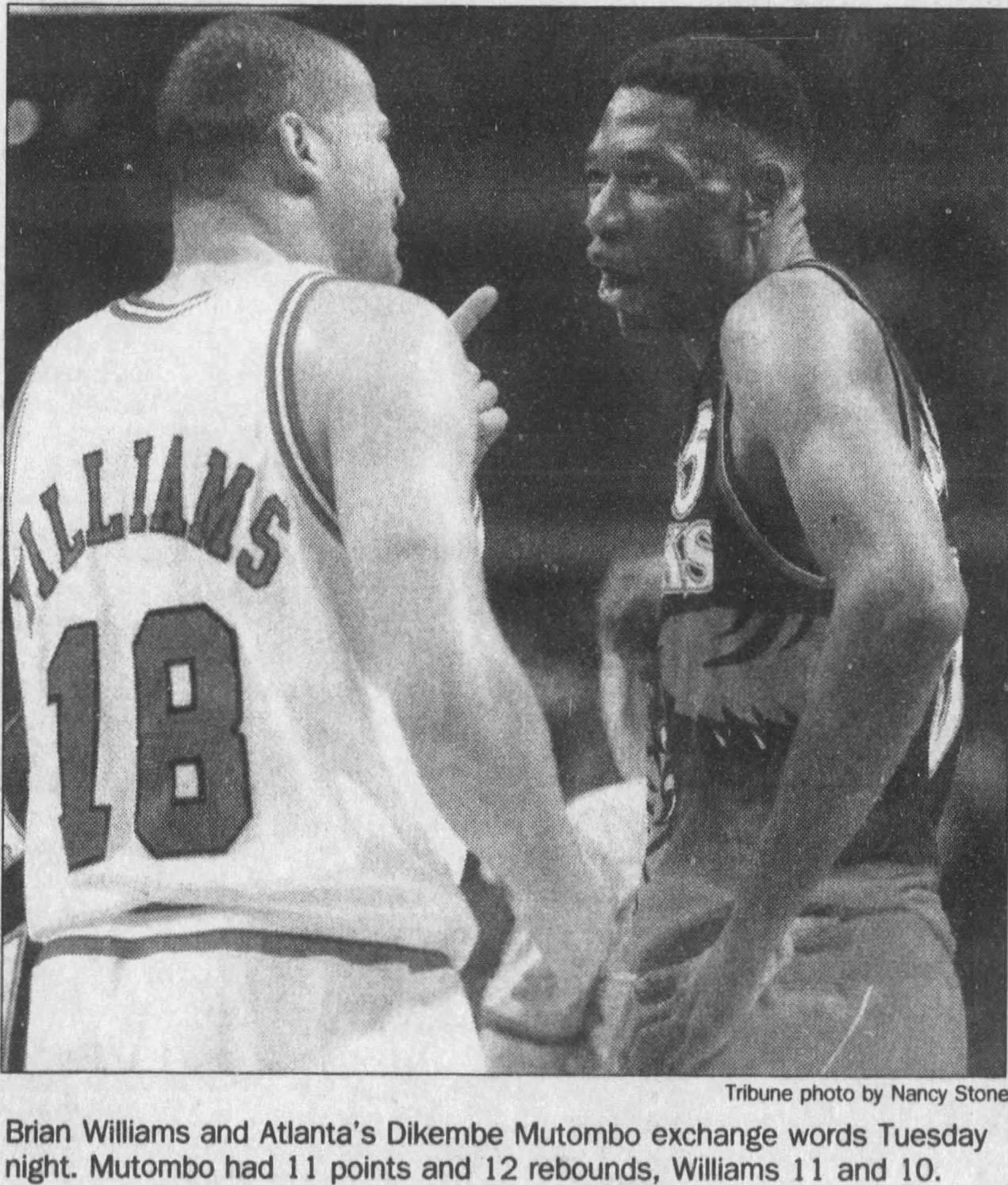
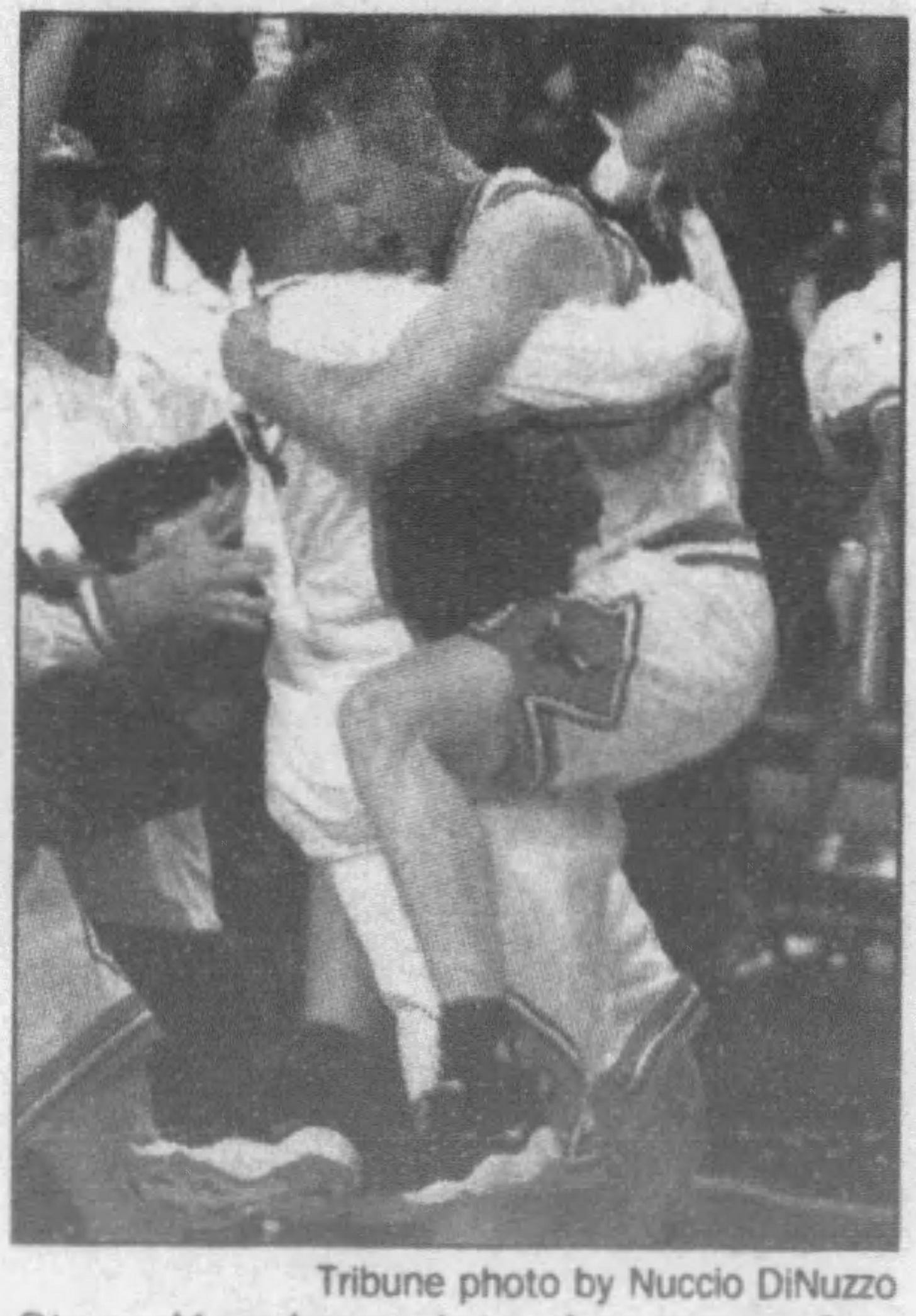

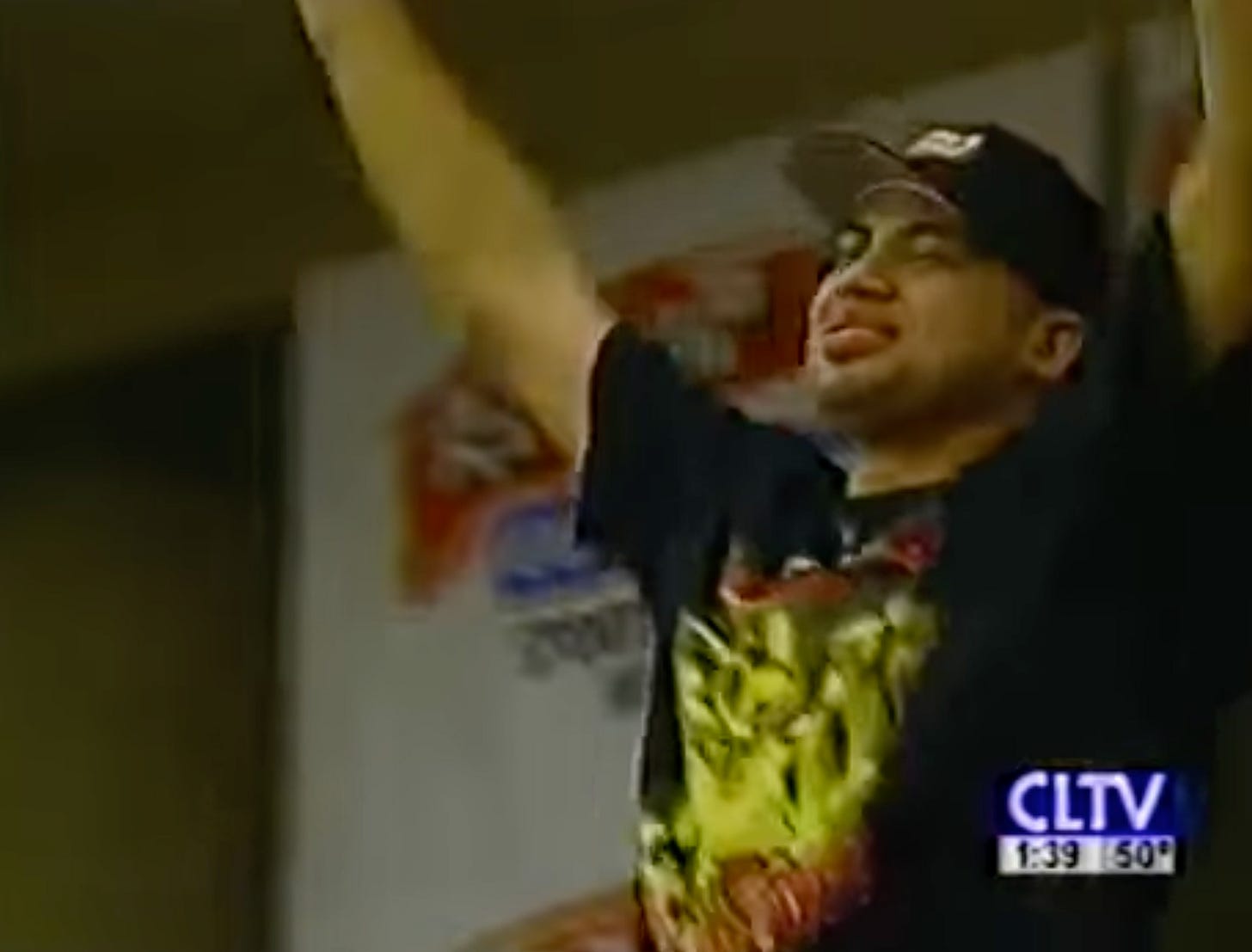
I absolutely loved this. Great job Jack.